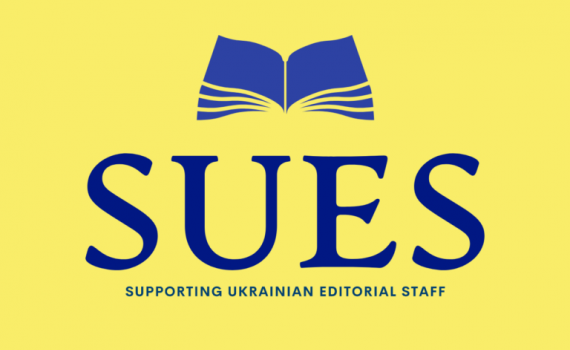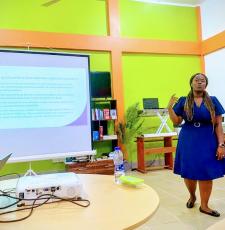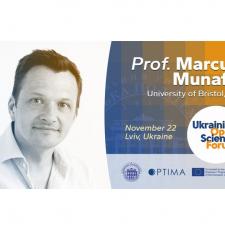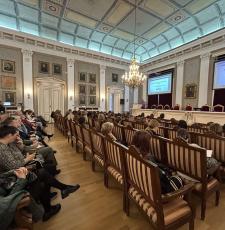
Iryna Kuchma, EIFL Open Access Programme Manager, provides an update on SUES, an initiative to support Ukrainian academic journals and publishers during the war with Russia.
Since the start of the war, EIFL has been involved in various activities supporting Ukrainian librarians and researchers. And so we welcomed the formation of SUES - Supporting Ukrainian Editorial Staff - in April 2022, and were among the first to join the initiative.
Within days of Russia’s invasion of Ukraine, which began on 24 February, academic activities were severely disrupted. Universities and libraries were bombed and scholars downed tools to join in the defence of their country, or relocated in other towns and countries. Several initiatives arose to support Ukrainian researchers. However, there was no specific support targeting the people and infrastructures responsible for sharing and communicating research - Ukraine’s more than 1,000 academic journals (including over 700 publishing open access), university presses and book publishers.
SUES, a coalition of organizations engaged in scholarly communications, was formed to fill this gap, to help journal editors and publishers with day-to-day activities, infrastructure, international visibility, and by building stronger relationships for the future. Led by OPERAS, SUES includes EIFL, the Directory of Open Access Journals (DOAJ), Open Access Publishing in European Networks (OAPEN), Directory of Open Access Books (DOAB), the Polish Institute of Literary Research - IBL-PAN, the Association of European University Presses, and Soutien à l'Édition Savante en Ukraine (SESU), which is a group of more than 30 professionals from the French academic publishing sector.
SUES’ first step, in May, was to circulate a questionnaire to Ukrainian journal editors and academic publishers to find out about their most urgent technical and financial needs. Most of the responses related to remuneration of staff - editors, reviewers, typesetters, proofreader and translators - and to publishing and printing costs. Many respondents also expressed the need to learn more about academic journal publishing, and best practices and standards.
An application process followed, through which SUES selected 45 journals for support, representing diverse disciplines. From this number, SUES chose 10 journals and launched a funding campaign, hoping to raise 16,500 Euros to provide each journal with a grant of about 1,500 Euros.
The results far exceeded expectations. In less than two months, from 6 May to 24 June, SUES raised 73,000 Euros - enough money to support all 45 journals. The three main sources of funding were individuals donating through the crowdfunding platform Wemakeit (over 20,000 Euros); publishers and the library community through the Sven Fund of Knowledge Unlatched/Wiley (36,000 Euros), and the French Ministry of Higher Education and Research, which donated 16,500 Euros through its Open Science National Fund.
We are extremely grateful to all the individuals and organizations who donated for their quick response to our appeal.
How the journals are using their funding
SUES is now steadily allocating grants to the 45 journals - and they are making good use of the money. Here is a snapshot of what they are doing, based on information provided to SUES and interviews conducted with journal editors by Rémy Ienco of SESU.
Thanks to SUES support, the Journal of Sociology: Theory, methods and marketing has been able to publish its second issue for 2022. The articles, which cover experiences of pandemic and war, institutional emergency conditions and stress perception, have been uploaded to the journal’s open access website. In addition, the grant covered small financial allowances for members of the editorial board, who are now working on the third issue for 2022, says Editor in chief Viktor Stepanenko.
Oksana Zayachkivska, Editor in chief of Medical Sciences, the Proceedings of the Shevchenko Scientific Society, is now able to produce and publish another edition of the journal and to complete and publish a book compiling research focused on COVID-19. Original Ukrainian research is currently scarce because of the war, says Zayachkivska, but the journal would try to continue, and hopes to attract articles from scientists in other countries. In addition to financial support, the editorial team is extremely grateful to SUES for newfound solidarity with the international publishing community, and for opportunities to collaborate, make connections and participate in conferences and webinars.
Ilona Kostikova, Editor in chief of Educational Challenges, said the SUES support was used to improve journal workflows, to invite international editors, authors and reviewers to take part in editorial processes, and to pay a technical editor for three months. She is now editing the forthcoming journal issue, preparing a journal to be indexed in DOAJ and will pay for journal hosting. But the SUES contribution was much more than financial: “When you help, we feel we are not alone,” she said.
Kseniya Kuzina, is scientific secretary of the journal From the archives of the VUChK–GPU–NKVD–KGB, which publishes documents and research based on records from the archives of the Soviet secret service. The journal’s work is essential, says Kuzina, because the topic of Soviet repression is off-limits in Russia, and during the invasion Russian troops have destroyed Ukrainian archives holding Soviet state security documents. The journal will use its SUES grant to publish another issue of the journal (number 57) and to ensure that the journal is indexed in DOAJ and Web of Science.
Mariya Pochinkova is the library director and coordinates publication of five scientific journals of Taras Shevchenko Luhansk National University. She says their most urgent needs are for funding to publish their journals, and also to move their repository to a more secure storage base. Her targets are journal registration in DOAJ and reinforcement of editorial boards with editors from other countries. We had a great meeting with Mariya discussing Creative Commons licence adoption and rights retention by authors.
Knowledge-sharing events for journal editors and publishers
SUES keeps in touch with Ukrainian journal editors and publishers, and their supporters, through the SUES blog. The blog provides updates on funding and disbursement of funds, encourages networking with Ukrainian editorial staff and shares information about knowledge and experience sharing events.
Responding to the requests from Ukrainian publishers to learn more about academic journal publishing, and best practices and standards, SUES initiated a Summer School from August to September. The Summer School comprised a series of webinars covering Best practices in journal publishing (in English); Indexing Journals in DOAJ (in Ukrainian) and Copyright and Licensing (in Ukrainian). EIFL hosted the two Ukrainian webinars with DOAJ Associate editor Nataliia Kaliuzhna, and we were happy to see 188 journal editors and publishers attending and having lively discussions.
The Summer School was followed up in October with a mutual learning session about journal publishing. The aim was to introduce and present three levels of scientific publishing in Ukraine and in France: a single journal, regional hubs, and national platforms.
WHAT’S NEXT FOR SUES?
For the future, SUES is seeking funding for a more comprehensive programme, and is approaching the European Commission and Ministries of Science in European countries for support.
Follow progress on the SUES blog, and EIFL will also provide updates on our website and social media - Facebook, Twitter - @EIFLnet.
SHARE / PRINT









